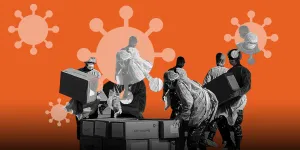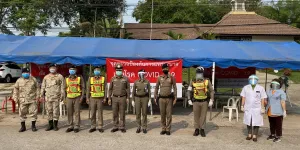By Prachatai |
<p>In a <a href="https://www.tlhr2014.com/?p=16785&lang=en">statement</a> released on Monday (30 March), Thai Lawyers for Human Rights (TLHR) says that while they find that it is necessary for the state to “impose measures” to control the spread of COVID-19, it finds that the Emergency Decree, in effect from 26 March to 30 April, “contains provisions which significantly restrict people’s rights and freedom,” especially freedom of expression, press freedom, and freedom of movement, raising concerns about the necessity and proportionality of the measures issued under the decree.</p>
By Protection International |
<p>The Network of People Who Own Mineral Resources issued a statement on Monday (30 March), raising concerns about the restriction to people's rights and freedom under the Emergency Decree, which limits freedom of assembly, reduce the people's participation, and close off complaint mechanism, resulting in the inability to exercise their rights according to the constitution and related bills to oppose the mineral projects.</p>
By Protection International |
<p>Protection International calls attention to the threat to human rights during the COVID-19 pandemic and calls for governments not to use their crisis responses as an excuse to crack down on human rights defenders and to ensure that their response measures are in strict accordance with human rights standard.</p>
By Amnesty International |
<p>The Thai government should ensure that the Emergency Decree on Public Administration in Emergency Situation (2005) to respond to the COVID-19 pandemic does not impose unwarranted restrictions on human rights, Amnesty International said today.</p>
By Prachatai |
<p>Arthit Suriyawongkul, a Thai PhD student at Trinity College Dublin, has filed a complaint with the Thai Administrative Court on Wednesday (25 March) calling for the repeal of the new travel restrictions announced by the Civil Aviation Authority of Thailand (CAAT), which require Thai nationals returning from overseas to present a fit to fly certificate and a certifying letter from their local Thai Embassy before being allowed to board a flight home.</p>
By Thai Lawyers for Human Rights |
By Prachatai |
<p><a href="https://www.article19.org/resources/thailand-emergency-measures-threaten-human-rights/">ARTICLE 19</a> and <a href="https://www.hrw.org/news/2020/03/25/thailand-covid-19-clampdown-free-speech">Human Rights Watch (HRW)</a> have issued statements following the announcement of <a href="https://prachatai.com/english/node/8429">emergency measures</a> by the Thai government yesterday (26 March), raising concern over how these measures may threaten freedom of expression and access to information.</p>
By Prachatai |
By International Commission of Jurists |
<p>As the Thai government moves to exercise its power under the Emergency Decree on Public Administration in Emergency Situation B.E. 2548 (2005) (“<a data-saferedirecturl="https://www.google.com/url?q=https://www.refworld.org/pdfid/482b005f2.pdf&source=gmail&ust=1585206537455000&usg=AFQjCNG_VFIFEdZeOfqxa6NegLia1_qjcg" href="https://www.refworld.org/pdfid/482b005f2.pdf" target="_blank" title="https://www.refworld.org/pdfid/482b005f2.pdf
Ctrl+Click or tap to follow the link">Emergency Decree</a>”) to combat the COVID-19 outbreak, the ICJ would like to reiterate its <a data-saferedirecturl="https://www.google.com/url?q=https://www.icj.org/wp-content/uploads/2012/06/Thailand-emergency-decree-report-2011-eng.pdf&source=gmail&ust=1585206537455000&usg=AFQjCNEEBuJOQN0Iu4KCZ5JZ-BDJL6sFBQ" href="https://www.icj.org/wp-content/uploads/2012/06/Thailand-emergency-decree-report-2011-eng.pdf" target="_blank">recommendations made since 2005</a> regarding lawful and proportionate exercise of this power in a manner consistent with Thailand's obligations under international law.</p>
By Prachatai |
<p>Prachatai presents the statistics of the COVID-19 pandemic in Thailand, as of 24 March 2020. </p>
By Human Rights Watch |
<p><a href="https://www.hrw.org/asia/cambodia">Cambodian</a> authorities should stop arresting people for expressing concerns about COVID-19’s impact in Cambodia and claiming they are spreading so-called “fake news,” Human Rights Watch said today.</p>












